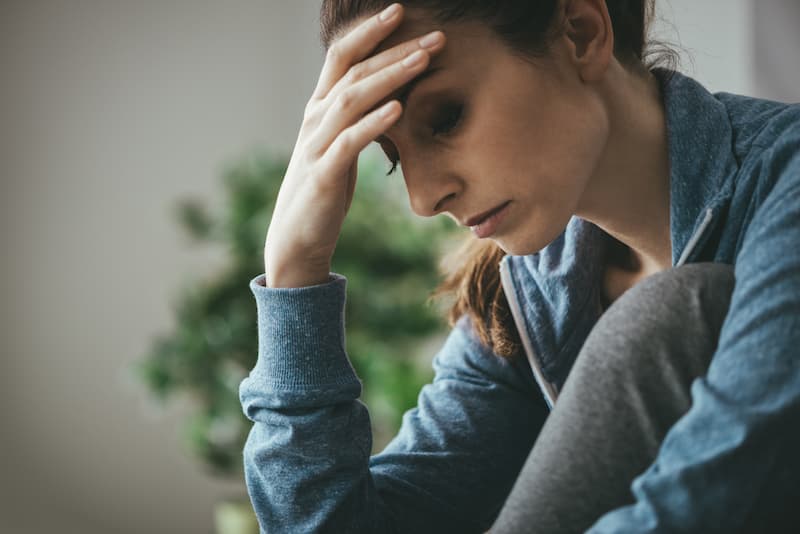Depression Hotline
Ad
PsychGuides independently researches, tests, and reviews products and services which
may benefit our readers. Where indicated by "Medically Reviewed by", Healthcare professionals review articles for
medical accuracy. If you buy something through our links, or engage with a provider, we may earn a commission.
The World Health Organization estimates that more than 300 million people suffer from depression worldwide.1 In the United States alone, more than 16 million people (or 6.9% of the population over the age of 18) experienced a major depressive disorder according to the 2016 National Survey on Drug Use and Health.2,3
Depression is a debilitating mental health condition that can interfere with daily life.1 According to the Diagnostic and Statistical Manual of Mental Disorders, Fifth Edition (DSM-5), people who experience depressed mood, a loss of interest or pleasure in everyday activities, and certain other symptoms such as weight fluctuations or sleep changes within the same 2-week period might be experiencing a major depressive episode.4,5
Although there are effective treatments for depression, fewer than half of those affected globally receive such treatments.1 In some cases, those suffering from depression turn to drugs and alcohol in an attempt to feel better or to numb their feelings. It is estimated that approximately 10.2 million adults live with a co-occurring substance use and mental health disorder.3
This relationship between mental health and addiction is dangerous, particularly because substance abuse can worsen certain symptoms of depression. Left untreated, this combination of depression and substance abuse could also place you at a higher risk for self-harm, injury, and suicide—but help is out there. Many people gather more information about these conditions and begin searching for treatment by first calling a hotline.
Don't Face This Alone. Professional Online Therapy Can Help You.

Should I Call a Hotline?
Most people experience periods of sadness in their lives after major events, such as a job loss, divorce, or the death of a loved one. However, clinical depression is different than regular sadness or a period of grief. According to the Diagnostic and Statistical Manual of Mental Disorders (DSM-5), depression may be diagnosed when you experience 5 or more of the following symptoms within a 2-week period:5
- Depressed mood most of the day.
- Loss of interest in almost all activities.
- Significant changes in appetite and/or weight disturbances.
- Insomnia or hypersomnia (excessive sleepiness).
- Feelings of restlessness.
- Fatigue or loss of energy.
- Feeling worthless or guilty (sometimes for no reason).
- Trouble thinking or concentrating.
- Recurring thoughts of death or of committing suicide (without a specific plan).
What Questions Should I Ask?
When calling a 24-hour depression hotline, it is important to share as much information as possible so that helpline staff can better gauge your situation to provide relevant treatment information. Before you call, you may want to write down questions you have which, depending on the helpline that is called, might include:
- What forms of treatment are available?
- What happens when you go to treatment?
- What are the next steps in getting help?
- How can I find 12-step groups in my community?
- What programs are available for depression and substance abuse?
If you are concerned about a family member, significant other, friend, classmate, or colleague, it can take an emotional toll on you. When calling for someone other than yourself, some questions to consider asking include:
- Where should I start if I think my loved one needs help?
- How do I talk to them about their depression?
- What resources are available for friends and family of depressed people?
When you call, you may be asked your first name as well as your age, which helps the counselors figure out what types of programs you are eligible for. You may also be asked any of the following questions:
- Are you safe?
- How can I help?
- How are you feeling?
- What is going on?
- Are you in immediate danger?
- Who do you go to for support?
- Are you using any drugs or abusing alcohol?
Mental Health Information
If you are struggling with both depression and substance use, it can be very difficult to pick up the phone and ask for help. But because all calls are confidential, you can feel safe about being open and honest—the person you speak with has experience and training and understands what you need. For more information about general mental health issues, the below resources may be a good place to start:
- The National Alliance on Mental Illness (NAMI) Helpline: This helpline can answer questions about mental health, treatment, and local support groups. Staff members are available Monday to Friday from 10 a.m. to 6 p.m. Phone Number: 1-(800)-950-NAMI (6264) or text NAMI to 741741.
- Substance Abuse and Mental Health Services Administration (SAMHSA): SAMHSA’s helpline offers 24/7 support in English and Spanish for treatment referral and support. You can call anytime you have questions about depression or substance use disorders. Phone Number: 1-(800)-662-HELP (4357).
- MentalHealth.gov: This website provides information about mental health disorders and available treatments.
- National Institute of Mental Health: This site provides free-to-access, research-based mental health information.
Other Depression Hotlines
For many people, depression is an extremely lonely experience. You’re not alone. A depression test can help you take the first step towards recovery and finding support. Calling a hotline gives you the opportunity to talk to a caring person who can help you work through whatever negative thoughts or feelings you have.
If this is an emergency and you need immediate assistance, please call 911. For all other depression-related inquiries, the below sites offer a variety of services for those seeking help.
- National Suicide Prevention Lifeline: This 24-hour suicide prevention helpline specializes in handling all situations related to suicide and emotional distress. Phone Number: 1-(800)-273‑TALK (8255), Live Online Chat.
- Disaster Distress Helpline: If you are experiencing depression, anxiety, or stress as the result of a natural disaster, call this number to speak to someone. Phone Number: .
- National Child Abuse Hotline: Depression often exists in situations where child abuse is present, and this 24/7 national hotline exists to prevent this type of abuse. You can reach professional crisis counselors at any time in more than 170 languages, using an interpreter. Phone Number: .
- Rape, Abuse and Incest National Network (RAINN): This free, confidential, and national sexual assault hotline is operated 24/7 by RAINN, which partners with local sexual assault service providers all over the U.S. Phone Number: .
- The Trevor Project: This is a 24-hour depression hotline for suicidal LGBTQ youth. Phone Number: .
- Veterans Crisis Line: Many vets struggle with depression and other debilitating mental health issues. If this is you or a loved one, call, text, or chat online 24/7 for support. Phone Number: ; text a message to 838-255.
- Crisis Text Line: This 24/7 crisis text line for anyone in crisis connects you with a trained crisis counselor via text. Text HOME to 741-741 in the U.S.
Sources
- [1]. World Health Organization. (2018). Depression.
- [2]. Anxiety and Depression Association of America. (n.d.). Facts & Statistics.
- [3]. National Alliance on Mental Illness. (n.d.). Mental Health By The Numbers.
- [4]. Tolentino, J. C., & Schmidt, S. L. (2018). DSM-5 Criteria and Depression Severity: Implications for Clinical Practice. Frontiers in psychiatry, 9, 450.
- [5]. Diagnostic Statistical Manual of Mental Disorders (DSM-5). (2013). Major Depressive Disorder. 160-168.






